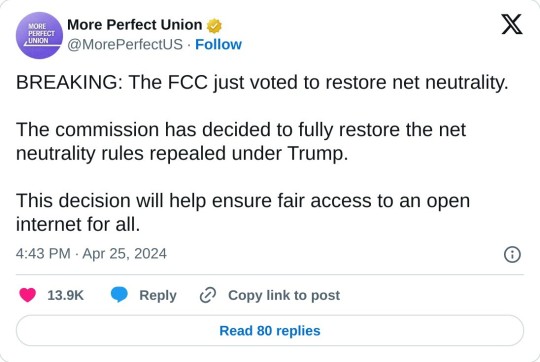#internet
Text


126 notes
·
View notes
Photo

#meme#funny#humor#tumblr memes#memes#memes daily#tweet#dank memes#memestagram#dark humor#polski blog#polish memes#polskie memy#poland#śmieszne memy#zabawne#polski tumblr#polska#viral#jokes#satire#entertainment#internet#humorous#irony#laughter
76 notes
·
View notes
Photo

Africa : Cost of 1Gb data
54 notes
·
View notes
Text

And Christ said unto them...
57 notes
·
View notes
Text
https://kristen-412.ludgu.top/i/2KLQAHB
#internet#nude art#fashion week#fundy#the originals#neko atsume#documentary#transgurl#fashion#196#cars 3#amazing butt
132 notes
·
View notes
Text
i got firefox on my phone and every so often i click a link that opens a web view in app, which is safari without adblockers and oh my god theres so many ads everywhere. i forgot how bad the internet is without firefox
49 notes
·
View notes
Text
US legislators are absolutely out of touch with reality — technology especially.
with kosa and tiktok censorship; with meta & google manipulating elections, trafficking private data, selling information to police, providing technology used in war crimes; with the cataclysmic environmental impacts of artificial intelligence… [to name a few]
ALL of the american tech companies do more harm to the world than one company in china.
none of that matters, solely due to the strong presence of a pro-palestine/anti-genocide movement on tiktok.
#tik tok#internet#kosa#censorship#palestine#gaza#us politics#first amendment#tech#tech bros#genocide joe#2024
44 notes
·
View notes
Text

#nostalgia#2000s nostalgia#kidcore#2000s aesthetic#kidwave#nostalgia aesthetic#nostalgiacore#internetcore#internet nostalgia#old internet#internet#funbrain#web core
29 notes
·
View notes
Text
Curry night at the Hastings Arms George Street Old Town Hastings
#interiordesign#interiors#art#artwork#artists on tumblr#artistic#design#fashion#tumblr milestone#flowers#arte#artuk#international#internet#lifetime#still life#real life#life#lifestyle#bloggers#blogger#blogging#blogs#blog#monacomontecarlo#spend money#monte carlo#montecarlo#money#monaco
23 notes
·
View notes
Text
If you've been on the Internet since the 90s... you've lost so many online friends.
Often just up and vanishing one day never to be heard from again.
People you trusted.
Even people you loved.
And you've never grieved these loses.
You've probably never even spoken about them.
Take a moment now.
Remember those you've lost.
You're not alone.
The loss was real.
AND WE UNDERSTAND.
❤️
26 notes
·
View notes
Text

#dereality#voidcore#lostcore#unsettling#internet#internet girl#halloweencore#oddcore#strangecore#weirdcore#dreamcore#dark aesthetic#liminal spaces#fever dream#liminalcore#emptycore#liminal reality#webcore#retrogaming#1990s#nostalgia#vintage#retro aesthetic
22 notes
·
View notes
Photo

#meme#funny#humor#tumblr memes#memes#dank memes#memes daily#dark humor#tweet#twitter#polandcore#polski tumblr#polska#polish meme#polishcore#memy polskie#memy śmieszne#śmieszne#entertainment#comedy#laughter#satire#humorous#internet#irony
66 notes
·
View notes
Text
"I'm not looking for something in particular - I want to find something I didn't know I was looking for. I want new ideas, new art, interesting people, new perspectives, this is the bigger promise of the internet - it's not just that it's a more convenient way for companies to be accessible online."
- Artists Revolt Against Social Media; The Deep Life by Cal Newport
17 notes
·
View notes
Text
Male trolls online play dumb when they claim they aren't racist for mocking Zendaya for her looks and comparing her to White women. They'll be like "oh she's just mid, don't pull the race card", so why aren't you comparing her to Halle Berry instead of Ana De Armas then? Why are the comments calling Zendaya a "diversity hire"?

Also why are guys so bothered that a woman they don't find attractive is famous anyway? I don't think Cillian Murphy handsome but I'm not going out of my way to make videos, memes and whole a internet trend to shit on his appearance.
15 notes
·
View notes
Text

I can't stress enough how much I miss StumbleUpon
111K notes
·
View notes
